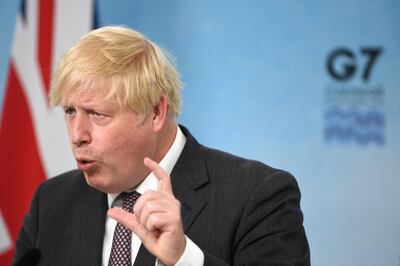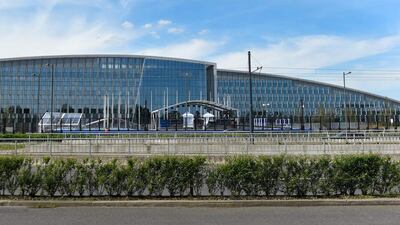British Prime Minister Boris Johnson will tell a Nato summit that global collective security must be at the heart of the recovery from the coronavirus pandemic.
Mr Johnson will address world leaders in Brussels on Monday where he will stress the importance of a united and robust alliance to meet the challenges ahead.
The Nato summit is the first since the Covid-19 outbreak and since US President Joe Biden took office five months ago.
“Nato is not just important to the UK’s security, it is our [global] security," Mr Johnson will tell attendees in Brussels.
“Nato owes it to the billion people we keep safe every day to continually adapt and evolve to meet new challenges and face down emerging threats. This will ensure Nato is still the bedrock of global defence for generations to come.”
“As we recover from the global devastation wreaked by the coronavirus pandemic, we need to do so with secure foundations. The peace and stability brought by Nato has underpinned global prosperity for over 70 years and I have every confidence it will continue to do so.”
This year, Britain outlined a major overhaul of its foreign, defence and security policy in the Integrated Review, which underlined Britain's steadfast commitment to the transatlantic alliance and promised a record increase in defence spending with a £24.1 billion ($34bn) investment in its military.
Britain is Europe's leading contributor to Nato and is involved in the deployment of the Carrier Strike Group, which is participating in exercises in the Mediterranean alongside allies before moving on to Indo-China.
In his remarks, the prime minister will voice his support for Secretary General Jens Stoltenberg’s Nato 2030 modernisation initiative, which includes stronger deterrence and security, as well as new policies on climate, cyber defence and preventing sexual violence in conflict zones.

Mr Johnson will underline the need for investment and research to tackle challenges of the future, including the effects of climate change and new threats, such as cyber attacks on national health systems.
The Nato talks come after world leaders converged on Cornwall in south-west England for the G7 summit where they discussed the climate crisis, economic recovery from Covid-19 and other geopolitical issues.
Attendees pledged to deliver one billion doses of coronavirus vaccines in 2021 to the world's least well-off nations and another one billion by the end of 2022.
In a communique, group members pressured China over human rights and the origins of the Covid-19 outbreak.
President Joe Biden said the US re-engaged in world diplomacy at an "extraordinarily collaborative and productive" G7 summit.
"America is back at the table and fully engaged," he said. Nato's mutual defence was a "sacred obligation" and democracies were in a "contest with autocracies", he said.
Mr Biden, who arrived in Europe last week, will visit Brussels on Monday before heading to Geneva for a showdown with his Russian counterpart Vladimir Putin before heading back to the US.


